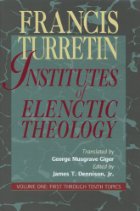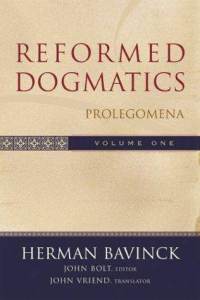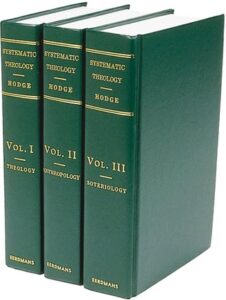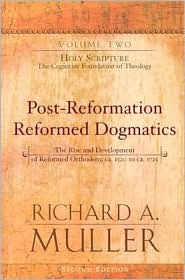On April 29, 2011, Robin Phillips posted: “Questions About Sola Scriptura” on his blog: Robin’s Readings and Reflections. What is so striking about Phillips’ comments is that he brings to light the internal inconsistencies within sola scriptura. This presents an opportunity to show that Orthodoxy provides a more coherent and compelling alternative. I would like to thank him for inviting me to respond to his blog posting.
Synopsis of Robin Phillips’ Posting
The posting begins with a description of James White’s debate with a group of Mormons. When the Mormons asked White to provide a justification for sola scriptura, he refused on the grounds that doing so would establish an authority higher than Scripture. The Mormons then asked White about the basis for recognizing a book as Scripture. White appealed to the criterion of consistency with other canonical scriptures.
The debate got Phillips thinking about the issue of sola scriptura. He put forward a one paragraph critique of sola scriptura by a hypothetical non-Protestant apologist.
Can you give reasons for believing in sola scriptura? Surely you can’t, because the reasons for believing in sola scriptura cannot be from outside of scripture, since then that would contradict the very doctrine of sola scriptura. But the reasons for believing in sola scriptural cannot be drawn from scripture either, because scripture never addresses the question of sola scriptura, nor does it even define scripture (after all, the church gives us the Bible’s Table of Contents page). Source
The key point of the critique is that sola scriptura can’t be logically defended because it excludes any extra-biblical authority. Phillips correctly points out that this critique is based on a distorted version of sola scriptura that Keith Mathison labels “solo scriptura.” Another problem with the hypothetical non-Protestant critique is that it is very Roman Catholic in its thinking. This is can be seen in the reliance on syllogistic reasoning and the insistence on logical consistency. This is very different from the Orthodox approach which stresses apostolicity and catholicity. This is unfortunate because by not representing the Orthodox approach it missed an opportunity for engagement with the Eastern Orthodox approach to the authority of Scripture.
In the next section Phillips notes that the classic understanding of sola scriptura — Scripture as ultimate authority but interpreted within the context of the regular fidei given by the church — raises the question of where the regula fidei is to be found. It also raises the question whether this approach to sola scriptura makes the individual the ultimate arbiter over what is the regula fidei.
Phillips wrote to Keith Mathison about this problem. Mathison wrote back that there are two possible answers: (1) a one true visible Church or (2) an invisible church manifested through various visible fragments or branches. Mathison opts for the latter. Phillips closes the posting noting that for him Mathison’s branch theory of the church does not seem workable in practice.
Basic Premises for the Orthodox Approach
The foundational premise for Orthodoxy is the Good News of Jesus Christ’s third day resurrection. This historical event establishes Jesus’ lordship over heaven and earth and his commissioning his followers to teach the nations (Matthew 28:19-20). It should be noted that Jesus did not promise an inspired Scripture but the Holy Spirit who would guide the church into all truth (John 16:13).
The apostolic witness is foundational to the Eastern Orthodox model. Paul and the other apostles planted churches upon the preaching of the Gospel. The apostles were keenly aware that they were speaking in behalf of the risen Lord and therefore their apostolic preaching had the weight of the word of God (I Thessalonians 2:13; II Peter 3:16). Apostolic preaching would in turn lead to apostolic succession (II Timothy 2:2). The New Testament churches were guided by the apostolic message in oral and written forms (II Thessalonians 2:15; I Corinthians 11:2).
The advantage of Orthodoxy’s stress on historicity is that it lends itself to external verification. Theology in the form of historical narrative can be found in Genesis and Deuteronomy. These narratives follow the ancient covenants in which the mighty deeds of the Suzerain are recounted prior to the presentation of the terms and obligations of the covenant. So likewise the historical narratives found in the four Gospels provide the covenantal basis for the New Testament. This openness to external verification means that one can exercise critical reasoning to examine the Orthodox Church’s truth claims and not be forced into blindly accepting the theological axiom of sola scriptura.
Orthodoxy has a pluriform understanding of the apostolic witness. It believes that the apostolic witness continued by several means: (1) in an inscripturated form, (2) the regula fidei — the confession of faith received at baptism, (3) the weekly eucharistic celebration in which the sacred texts are read, and (4) the bishops — the successors to the apostles whose job is to expound on the meaning of Scripture and keep the apostolic witness intact for the generations to come.
Protestantism also believes in apostolicity but in a quite different manner. It believes that after the apostles died the apostolic witness continued solely in an inscripturated form and that the authority of Scripture is independent of the church. Where Orthodoxy assumes an essential continuity between the apostles and the post-apostolic church, the Protestant model interposes a series of ruptures or discontinuities. It assumes that the post-apostolic church quickly fell into heresy and apostasy, and that the Gospel was rediscovered with the Protestant Reformation.
Thus, Orthodoxy assumes a church embedded in human history but faithfully safeguarding the apostolic faith; Protestantism seems to assume a pure Scripture sailing through church history unaffected by the vicissitudes of human failings. In essence, the Protestant paradigm wrenched Scripture out of its proper context: the one true church. If one isolates the covenant document from the covenant community one ends up with either ecclesiastical tyranny or hermeneutical chaos.
Orthodoxy’s Criteria: Apostolicity, Continuity, Fidelity, and Authority
Much of the complexities surrounding sola scriptura can be more easily understood if one approach it as a theological system. Sola scriptura is designed to meet certain functions essential to a theological system: (1) provide a basis for the formulation of doctrine and practice, (2) provide a hermeneutical framework for the right reading of Scripture, and (3) provide doctrinal unity for the community of believers, the church. In what follows I hope to show that the approach taken by Orthodoxy does a better job of fulfilling these functions for a theological system.
Canon Formation. How does one know that Scripture is inspired? And how does one know which books are sacred Scripture?
Canon formation had its start in the life of the early church. The apostles’ letters and the four Gospels were read out loud during the weekly Eucharist (First Apology of Justin, Chapter LXVII; cf. Acts 2:42). The weekly Eucharist was under the supervision of the bishop, the successor to the apostles (Ignatius’ Letter to the Smyrnaeans, Chapters VIII-IX). The recognition of what was Scripture depended on its acceptance into the readings of the weekly Eucharistic gathering. The main criterion seems to have been apostolicity: what one church received from one apostle was mutually recognized and shared with other churches founded the other apostles. Early on there was a consensus about the four Gospels and most of Paul’s letters. There was some dispute about the other writings like Hebrews, Jude and Revelation which would in time be recognized as Scripture.
Initially, canon formation was a local and informal process. Later regional councils formalized the process through the making of official lists, i.e., canons. The main intent behind these lists was to provide guidance to the scripture reading in worship. These councils include: the Council of Laodicea, the Council of Carthage, and Apostolical Canon which was later approved by the Council in Trullo. When the later Councils, e.g., the Sixth Ecumenical Council, endorsed the decisions of earlier councils the process of canon formation was concluded.
The Protestant appeal to the criterion of consistency is really an appeal to an abstract ideal. What it does is put the individual Protestant in the driver’s seat when it comes to canon formation. The Orthodox approach on the other hand is historical and conciliar. Unlike Protestantism which takes divine inspiration as its starting point for canon formation, Orthodox takes apostolicity as its starting point. This approach is premised upon the Holy Spirit’s active presence in the post-apostolic church. This approach avoids the debate over whether the Church wrote the Bible or whether the Church is based on the Bible. The answer is that both are the inspired product of the Holy Spirit.
This is why apostolic succession matters so much for the Orthodox. Continuity in episcopal succession and continuity in teaching are two important means for safeguarding the proper reading of the Scripture. Continuity in teaching can be verified through reading the Church Fathers and the Ecumenical Councils. This means of verification guards us from the secret knowledge of the Gnostics and heretical innovations. Formal apostolic succession is not enough; there must also be continuity in teaching — fidelity. The Church of Rome can claim formal episcopal succession but after the Schism of 1054 its theological system became increasingly removed from its patristic base.
The 1054 Schism and the Filioque controversy represent a watershed moment in church history. If one accepts the Filioque clause then one accepts the Western approach to theology which assumes that Christian theology evolves in light of the church’s understanding of Scripture. The Eastern Orthodox approach assumes that the Christian faith has been delivered to the saints once for all time and that the apostolic deposit must be guarded against change.
Hermeneutics. How does one arrive at the right understanding of Scripture? What is the proper approach for the reading of Scripture?
When one encounters difficulty in understanding a text the best thing to do is to ask the author of the text what he or she intended. If the author is no longer living the next best thing is to do is to ask the students who studied under him. This is the advantage of apostolic succession. This is why the study of the early church fathers is so important to the proper reading of Scripture. It provides a means by which one can access the original intent of the author. However, this approach works only if it can be shown that a historical linkage exists going back to the original Apostles. Orthodoxy can make this claim, Protestantism cannot.
In the early church one could not be a member unless one had been baptized and catechized. Being catechized meant that one had learned from the bishop the regula fide — a short creed much like the Apostles Creed. The regula fide has its roots in the oral apostolic teaching. It was not derived from an exegesis of Scripture. It comprised an independent and complementary witness to Scripture. The Apostles Creed was the hermeneutical framework through which the early Christians read Scripture. In time the local creeds would become the Nicene Creed, the definitive confession of faith for all Christians.
Keith Mathison affirmed the creeds of Nicea and Chalcedon as representative of the regular fide on the basis of the witness of the Holy Spirit. Mathison’s approach is vulnerable to the criticism that he affirms these two creeds because they conform to his personal interpretation of Scripture. This leaves him open to the criticism of circularity. Orthodoxy affirms the Nicene Creed and the Chalcedonian Formula on the following principles: (1) it was the decision made by the Church through its bishops the successors to the apostles and (2) it was received by the Church as a whole (catholic). Orthodoxy’s emphasis on apostolicity and catholicity avoids the pitfalls of individual interpretation of Scripture and circular reasoning.
Magisterium and Communion. Who has the authority to expound on the meaning of Scripture? What are the marks that identifies the true Church? Can doctrinal orthodoxy and church unity go together?
Mathison takes the classic Reformed position that the Church is the true interpreter of Scripture. But this leads to the question: “Where is this Church?” Mathison rejects Roman Catholicism and Eastern Orthodoxy for the Protestant branch theory of the church. Mathison’s position is that while there may be several branches, some are the closer to the regula fidei than others. This approach is like the popular Where’s Waldo? game. But did Jesus intend that his followers should have to search high and low to find the true church? I propose that a better approach is to assume that the early church in the book of Acts was the true church, that it had received the regula fidei from the apostles, and that one of the identifying markers of the true church is historical continuity that can be traced back to the original apostles.
In Orthodoxy, Scripture is read and understood within the context of Tradition. The bishops as successors to the apostles are the authorized expositors of Scripture. Unlike the original apostles, present day bishops cannot lay claim to new revelations, rather their authority is confined to the exposition of the meaning of Scripture according to Tradition. Where the magisterium in Orthodoxy is grounded in apostolic succession, in Protestantism it is quite often grounded in academics. I remember walking across the Gordon-Conwell campus and realizing that the teaching authority of my seminary professors came from their Ph.D. degrees, not from their ordained standing. My Gordon-Conwell professors could appeal to reason and scholarship, but they could not invoke the authority of the church.
Eastern Orthodoxy’s rejection of the branch theory can be seen its practice of closed communion: only those who are in agreement with the teachings of the Orthodox Church and live under the authority of her bishops are allowed to receive Communion. Being in communion with the local bishop means being in communion with all other Orthodox bishops around the world and their historic predecessors all the way back to the original apostles. This gives Orthodoxy remarkable doctrinal consistency in comparison to Protestantism’s fragmented polity and considerable theological confusion. Likewise, Orthodoxy’s position on closed communion undercuts the conundrum of Mathison’s proposition that if one submits to others only when one agrees with them then one is really submitting to oneself. One can freely submit to the magisterium of the Orthodox Church but this in no way impinges upon her authority.
Conclusion
As a theological system sola scriptura is highly problematic. One, it is highly instable. This can be seen in the two versions: the classic sola scriptura vs. the popular solo scriptura. Two, another problem is its theological incoherence. This can also be seen in the doctrinal confusion among Protestants even though they hold in common sola scriptura as the starting point for doing theology. Third, it is unable to promote Christian unity. This troubling propensity for doctrinal heresies has forced many a Protestant to have to uproot themselves and look for a new church home giving rise to the question: Where is the true church? Doctrinal orthodoxy in Protestantism has quite often meant leaving a mainline denomination for a smaller and sectarian branch. Orthodoxy and catholicity seem to be incompatible opposites in modern Protestantism.
When I was a Protestant I was frustrated by the theological chaos between popular Evangelicalism and mainline liberalism. I found sola scriptura to be a heavy burden because I was compelled to assess the latest theological fads against my study of Scripture. I gave up on sola scriptura when I concluded that it was incapable of producing a coherent theology capable of uniting Protestantism. I found the branch theory espoused by Keith Mathison of very little practical value. I often felt like I was standing under a leaking umbrella in the pouring rain wishing that I was safe and dry in a house. I found a roof over my head and a spiritual banquet — the Eucharist — laid out every Sunday when I became Orthodox. To become Orthodox I had to renounce sola scriptura but in its place I gained the true Church founded by the apostles. Orthodoxy’s theological system has a stability and coherence unmatched by the best Protestantism has to offer.
Robert Arakaki








Recent Comments